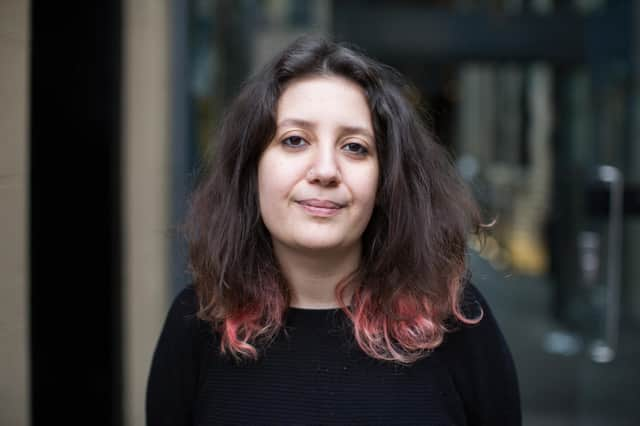Sara Shaarawi on her new play Sister Radio: 'It's an exploration of loneliness'


How does it feel to be out of your country at the very moment it undergoes a seismic change? It is a sensation currently being experienced by Ukrainian refugees, watching from afar as Russia continues its assault on their homeland. They will feel at once relieved to be in safety and anxious not to be able to help.
Something similar happened a decade ago to playwright Sara Shaarawi who viewed the upheavals of the Arab spring in her native Egypt from her new home in Scotland. As the news from Cairo's Tahrir Square gripped the world, she was at one remove, studying at the University of Edinburgh.
Advertisement
Hide AdThe same thing would have been felt by ex-pat Iranians in 1979 when the Islamic revolution brought Ayatollah Khomeini to power. That thought is, in part, what led Shaarawi to write her latest play about two sisters, Fatemeh and Shirin, who have shared their Edinburgh flat for 43 years, arriving at a time of turbulence in Tehran.
"Things are happening in their home country and they're not part of it," says Shaarawi, who made the sisters Iranian rather than Egyptian to give herself some distance from the story. "I drew a lot on my experience. I came to Edinburgh in 2011 and that feeling of, 'Something big is happening in my home country, but I'm here' made its way into the play. The situation is different, but there is a lot that is quite personal."
Also personal – to her as much as the rest of us – is the experience of the pandemic. She started thinking about the play before the arrival of Covid, but wrote it in lockdown when the sense of confinement was at its most intense. Trapped in their flat, the sisters can only retreat into their memories. "The pandemic heightened the set up," she says. "It really made it an exploration of loneliness, isolation and different ways of coping."
Not content with making the imaginative leap to a time ten years before she was born, the playwright gave herself an additional challenge. Although they live at close quarters, Fatemeh and Shirin no longer talk to each other. Writing for the theatre, where speech is everything, the playwright had to think creatively.
"I wanted to write an intimate piece about two sisters who live together but don't speak," says Shaarawi, whose audio promenade play Niqabi Ninja was highly regarded in last year's Edinburgh International Festival. "It's that weird thing with families – the grudges and rituals they share. They do speak to other people; they just don't speak directly to each other."
She adds: "I like to set myself writing challenges. There is a lot of writing in the silent scenes. They are not by-the-book stage directions; they have feelings, emotions and thoughts. I put myself in them quite a lot. They're quite playful and I had a lot of fun writing them."
Advertisement
Hide AdOne of her solutions to the language problem is to follow two timelines. The icily silent world of today runs in parallel with fading memories of a childhood in Iran, a time before the talking had stopped. "Magic realism is my thing," she says. "I'm interested in what would be considered ghosts or a presence on stage that isn't within the real world. I call it a double exposure because you see two timelines happening at the same time, sharing the same space. They're not flashbacks; they're memories that flare up and then flare out."
Director Caitlin Skinner, who is staging Sister Radio in a Stellar Quines co-production in Pitlochry – the first show in the theatre's new studio – relishes the challenge. "What a gift for a director to have to figure out how to tell that story," she says. "A lot of my process even in new plays involves improvising and allowing the actors to discover things. The stage directions are things the characters are doing, but also things they're thinking and I'm so excited to do that."
Advertisement
Hide AdBeing focused on women – and older women, at that – the play fits the remit of the female-led Stellar Quines. Telling an Arabic story, it is also a rarity in Scottish theatre, something Skinner and Shaarawi are proud of.
"I don't see enough playful roles for older women," says Shaarawi. "There are a lot of older women in my life that I draw inspiration from and there is a little bit of all of them in these characters. The challenge for me was actually writing the scenes when they're younger because I had to bring the 70s vibe to the stage."
She has similar thoughts about putting South Asian stories on stage. "Do we have an East Is East of Scotland?" she asks, pointing to Ayub Khan-Din's play and movie about a mixed-heritage family growing up in 1970s Salford. "South Asia is hugely under-represented in a way that is troubling to me. There is a breadth of experiences in any country and it's really important to represent that. These stories and totally part of the Scottish fabric."
Skinner joins in. "I don't know that I've seen a play about a Scottish family like this," says the director. "A story about migration, family obligations, living in one place and longing for another one… there are a lot of things I've just not seen in Scottish writing. But I'm mostly excited about what Sara wants to put on stage."
Sister Radio is at Pitlochry Festival Theatre from 25 August until 28 September; Perth Theatre, 27–28 October; Lemon Tree, Aberdeen, 2 November.